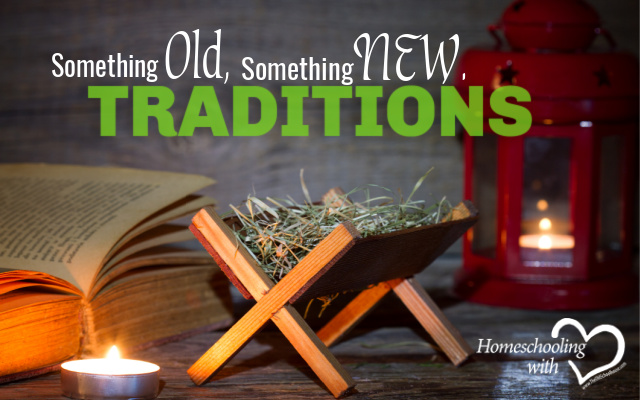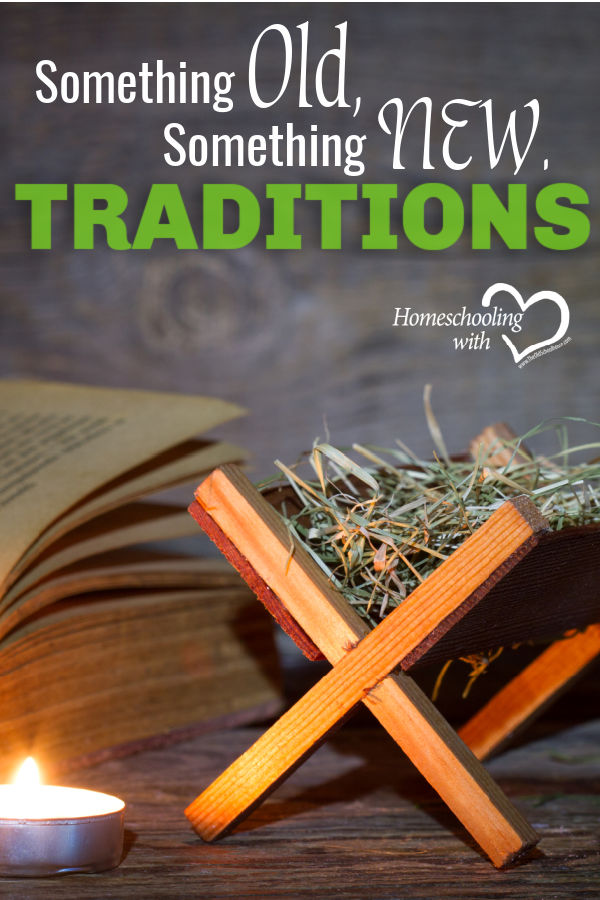Something Old, Something New. Traditions


This morning I read a suggestion that Thanksgiving might need to be cancelled this year due to concerns over COVID-19. What? Cancel Thanksgiving? Memorial Day parades and picnics. Fourth of July celebrations. Halloween trick-or-treating. All cancelled. Now, Thanksgiving?
We are entering what is often called the “holiday season:” Thanksgiving, Christmas, and New Year’s Day. While public celebrations may be cancelled, our traditions can’t. Traditions are an important part of our family and for passing on values to the next generations.
Sometimes traditions can cause disagreement in a family because each spouse comes from a different background—a different tradition. This can make the holiday season a little more tense but needn’t be a source of conflict.
The holidays, beginning with Thanksgiving and continuing through New Year’s Day, was an event in my family. For my husband … not so much. My family didn’t put most packages under the tree until the evening of Christmas Eve. My husband’s family opened some gifts on Christmas Eve. Our family went to a candlelight church service. My husband’s family didn’t attend church.
For some people, these might be irreconcilable differences. Holiday traditions can be so rooted in our families we can’t imagine anything different. Some customs can go back through generations. Many of us can’t imagine a Thanksgiving or Christmas without our beloved practices.
This year with restrictions in our celebrations, some of our cherished traditions may need to be set aside for a season. Having a big family dinner at one location. Taking homemade treats to a care facility. Even the act of gift giving. This year, which has been different in so many ways, may be the time to revisit some of the family traditions that haven’t made their way to our homes.
What did your family do when you were a child that you don’t do now? How about your spouse’s holiday celebrations? List the ones you miss and would like to try this year. Maybe your spouse’s family did something you thought really odd for a holiday. Give it a try this year. Who knows? The family may enjoy it enough to continue in coming years.
Some family traditions may be hard to give up because they have so much significance. The family I grew up in went to candlelight service on Christmas Eve. We continued doing that while raising our children. This year in many areas of the United States these services will not be possible. Why not have a private candlelight service in your home?
Think through your traditions. Are you hanging on to some of them because, well … they’re traditions?
A story is told of a woman who cut the Thanksgiving turkey in half lengthwise before cooking. When asked why she did this, the response was “my mother cooked turkeys this way.” One year, the lady’s mom visited for Thanksgiving and noticed the turkey being split before putting in the oven. Mom also asked, “Why?” The surprised daughter replied, “Because that’s the way you did it.” Her mother laughed, “I cut the turkey because the oven wasn’t tall enough for a whole bird.”
Often, we move through traditions not knowing or caring the origin. In some cases, we don’t even like the tradition, but we continue with it anyway. In this new situation, it may be time to evaluate if traditions are continued only because “that’s the way we’ve always done it.” Make this a year a novel tradition year by not doing some of them. See what happens. Does it change the joy and meaning of the holiday? Do family members care?
When considering eliminating a tradition, consider the following:
- Determine if the traditions have family roots or are part of a cultural heritage. Our Hispanic neighbors always have a Christmas tamale feast. Part of the tradition is making the tamales. This family invites the neighborhood to join them. We may want to keep these types of customs to pass on family culture or history.
- Next think about our faith traditions. Some generational customs are based on religious beliefs. In my childhood household, we set the nativity scene under the Christmas tree to acknowledge God’s gift to us. When my children were growing up, we continued the tradition but added to it a little bit. No gifts were put under the tree until God’s gift was there. Nativity Day was never the same date. Some years we waited until Christmas Eve. These faith customs may be important to passing our faith onto our children and grandchildren.
- Then look at what’s left. Determine why some of the traditions came about. My husband’s family opened some gifts on Christmas Eve because one parent had to work on Christmas Day. This allowed for a family gift-sharing time. It wasn’t something that needed to be passed on to the next generation. Some of the non-cultural or non-religious traditions may just be fun and worth keeping, even if there’s no special significance.
Is there something you’ve seen on Pinterest you’ve been wanting to try? This may be the year to try something new. These may be something completely different than your family has ever done before. A friend’s family started a tradition of a family Christmas breakfast rather than a Christmas dinner. They have breakfast at a different family member’s home each year, and no one has to host an elaborate dinner on a hectic day. This tradition also makes it possible for the grandchildren to visit both sets of grandparents on Christmas Day.
Another option might be to celebrate a tradition from another culture or country, such as Kwanza, St. Nicholas Day, or All Saints Day. In Puerto Rico, gift-giving is on Three Kings Day, a festive holiday on January 6.
Consider also the lesser known days of observance and what you can do. These days include Rosa Parks Day (Dec. 1), Native American Heritage Day (Nov 27), and Wright Brothers Day (Dec 17). Certainly out-of-the ordinary, but with some creativity and fun, these days of observance may become the tradition your children remember the most.
One word of caution: We homeschoolers tend to turn everything into a school lesson. Fight it. If lessons are learned, it’s an extra bonus. The idea is to have fun, enjoy each other, and have joy in the midst of a time of trouble.
The holiday season should be a time of peace for individuals as well as families. The year 2020 has brought with it doom and gloom. With a few changes, we don’t need to lament the loss of a tradition. Our families can continue to experience the fun, joy, and peace of the season. When the worship of Jesus is kept at the center, no matter the circumstance, traditions can be altered and renewed for a pleasant and warm family time.
Susan K. Stewart, Nonfiction Managing Editor with Elk Lake Publishing, teaches, writes, and edits non-fiction. Susan’s passion is to inspire readers with practical, real-world solutions. Her books include Science in the Kitchen, Preschool: At What Cost?, Harried Homeschoolers Handbook, and the award-winning Formatting e-Books for Writers. Her latest book, Donkey Devos: Listening to you donkey when God speaks, is scheduled to be released spring 2021. You can learn more at her website www.practicalinspirations.com.













































